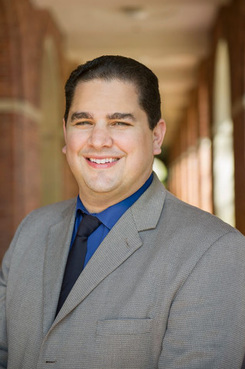How Law Schools and JD Applicants Find That Love Connection
Law school acceptance letters have rolled in. Now comes the hard part: choosing where to go. Here's how would-be 1L's and the schools achieve the right match.
April 12, 2018 at 02:10 PM
8 minute read
Deposit deadlines are looming at law schools across the country, and thousands of admitted students are still grappling with the decision of which campus to attend in the fall. Should they pick the school with the highest graduate employment figures? The one with the smallest price tag? The lower-ranked school in their dream city?
We asked people involved in the selection process—a current student, an admissions dean, a law school dean and a law school consultant—for an inside look into the experience. They've provided insight on negotiating scholarships, working the waiting list, trusting gut instincts and more. Here's what they said:
Meridith Hoover, Third-Year Law Student, University of Michigan Law School
Meridith Hoover considers herself fairly risk averse, a trait she developed after narrowly escaping death as an undergraduate at the University of Alabama in 2011, when a series of tornadoes ripped through Tuscaloosa. She rode out the twister in a bathtub covered with a mattress.
“The roof and all the other walls were gone,” said Hoover, now a third-year student at the University of Michigan Law School. “I had called my dad to tell him goodbye, basically.”
So when it came time to choose a law school, Hoover approached the decision with caution. She knew she wanted to be a public-interest lawyer and realized those jobs don't come with Big Law paychecks. She aimed for a law school that would position her for such a career while not saddling her with a mountain of debt.
Hoover had no shortage of options. She was accepted at all of the so-called T-14 schools—the top 14 schools according to U.S. News & World Report—with the exception on Yale Law School. (Stanford Law School placed her on the waiting list.) Landing on her short list were Michigan; the University of Virginia School of Law; the University of Chicago Law School; and Harvard Law School.
“There was about four months where I was trying to figure out what to do,” she said. “It was stressful. Not because I didn't have good options—obviously I had good options—but I could see myself at a variety of places.”
In the end, her decision boiled down to cost and the vibes she got on campus visits and from admissions offices. Michigan offered the sweetest deal: A full scholarship and stipend enabling her to graduate with no loans. Other schools also offered generous financial aid, but Hoover decided not to negotiate for more money after a visit to Ann Arbor sold her on Michigan.
“It sounds silly, but I think it's so important to trust your gut,” she said. “I'd tell people to do what feels right to you and don't listen to other people.”
Douglas Sylvester, Dean, Arizona State University Sandra Day O'Connor College of Law
Douglas Sylvester admits that he has talked more than a few admitted students out of coming to Arizona State University Sandra Day O'Connor College of Law. That may seem like a strange play for the man who has led the Phoenix school since 2012, given that recruiting students is an important part of the law dean gig. But as Sylvester sees it, no one benefits when students are unhappy or feel that the school hasn't lived up to the promises made during the recruiting process. He counsels admitted students—by the hundreds each year—to look within themselves to determine the best law school fit.
“I do talk to students about choosing other law schools because they already have a job lined up, or they know they want to stay in a particular geographic area and they've been admitted to a slightly lower-ranked law school than us in that place,” Sylvester said. “It's really about knowing who you are.”
Of course, Sylvester also has spent a significant amount of time making the case to admitted students that ASU has a strong employment and bar pass record, and that the school will do all in its power to help them pursue their career dreams. He recommends that admitted students look not just at a school's U.S. News rank, which Sylvester says is an important indicator of how the legal profession will view their law degree, but also at the wealth of data now available on student debt loads, graduate employment and bar passage rates.
Armed with that information and acceptances from multiple schools, admitted students should try to negotiate better financial aid packages, Sylvester said. Negotiations have become more common since the law school applicant decline began in 2011.
“We absolutely see a lot of students trying to wheel and deal,” he said. “I'm fully in favor of it. There are limits to what anyone can do. But I think we live in a place where students and consumers should be making choices based on what's best for them.”
David Kirschner, Dean of Admissions, University of Southern California Gould School of Law
There's no substitute for showing up on campus and kicking the tires a bit.
That's the advice David Kirschner regularly doles out to prospective and admitted students at the University of Southern California Gould School of Law, where he is dean of admissions.
“In a fancy brochure, a publication, or a video, you're getting the message the law school wants to get to you,” Kirschner said. “But that's not a substitute for actually experiencing—in reality—what the environment is like. You can't get a sense of the camaraderie, or collegiality, and interaction.”
USC offers tours every day of the week and encourages visitors to sit in on a first-year class to get a sense of what attending law school is really like and to see what the school has to offer. The admissions office strongly believes that admitted students who take the time to come to campus are more likely to enroll at the school, Kirschner said, just as prospective students get a better sense of where they fit by visiting multiple law schools.
Equally important are “authentic interactions” with faculty and students beyond admitted student events, he said.
“When admitted students are here, we tell them, 'Yes, we've put together an entire day of programming for you. But in your downtime, go talk to students who aren't on our panels and who aren't seated with you at lunch. Grab a seat and go have a conversation with anyone.' We obviously don't have control over what everybody in the building will say, but we are supremely confident that based on those snippets of conversation, an admitted student will walk away with a more favorable opinion of us.”
Anna Ivey, Consultant, Anna Ivey Consulting
One of the biggest misconceptions Anna Ivey encounters from admitted law students every year is that their options have solidified by the time deposit deadlines arrive in April and May.
In fact, many applicants have unknowingly been waitlisted by schools and are still in the mix by the time they need to put down a deposit at a campus where they have a firm offer, said Ivey, a law school admissions consultant.
“Admissions season is not over yet,” she said. “Schools keep very deep wait lists, and in fact there is movement through May, June and July. Sometimes you might get a call during orientation because a spot opened up somewhere else. There is this whole game of musical chairs that happens throughout the summer.” So what's a confused admitted student to do?
Ivey counsels her clients to put down a deposit at their top choice among the schools that have offered admission as insurance, but remain prepared to accept a spot off the waiting list if it's from a school higher on their list. (It's not kosher to put down deposits at more than one school, Ivey said.)
Snagging a waiting list spot comes with a catch, however. Coming in off the waiting list greatly diminishes an admitted student's ability to secure a strong financial aid package. Hefty scholarships tend to be awarded to applicants with relatively strong LSAT scores and undergraduate grades who were offered admission straight away, Ivey said. Wait-listed students generally don't have the credentials to warrant generous packages, and the scholarship budgets are often tapped out by the time wait-listed students enter the picture, she said.
But for those who initially receive admission offers, negotiating for bigger scholarships makes sense.
“If your numbers are strong for a given school, and you have a competing scholarship offer, absolutely I would try it,” Ivey said. “It's not unusual for schools to come back with a better offer. The worst thing they can say is, 'No.'”
This content has been archived. It is available through our partners, LexisNexis® and Bloomberg Law.
To view this content, please continue to their sites.
Not a Lexis Subscriber?
Subscribe Now
Not a Bloomberg Law Subscriber?
Subscribe Now
NOT FOR REPRINT
© 2025 ALM Global, LLC, All Rights Reserved. Request academic re-use from www.copyright.com. All other uses, submit a request to [email protected]. For more information visit Asset & Logo Licensing.
You Might Like
View All

Step 1 for Successful Negotiators: Believe in Yourself

Deluge of Trump-Leery Government Lawyers Join Job Market, Setting Up Free-for-All for Law Firm, In-House Openings
4 minute read
Ballooning Workloads, Dearth of Advancement Opportunities Prime In-House Attorneys to Pull Exit Hatch
Trending Stories
- 1Critical Mass With Law.com’s Amanda Bronstad: LA Judge Orders Edison to Preserve Wildfire Evidence, Is Kline & Specter Fight With Thomas Bosworth Finally Over?
- 2What Businesses Need to Know About Anticipated FTC Leadership Changes
- 3Federal Court Considers Blurry Lines Between Artist's Consultant and Business Manager
- 4US Judge Cannon Blocks DOJ From Releasing Final Report in Trump Documents Probe
- 5White & Case KOs Claims Against Voltage Inc. in Solar Companies' Trade Dispute
Who Got The Work
J. Brugh Lower of Gibbons has entered an appearance for industrial equipment supplier Devco Corporation in a pending trademark infringement lawsuit. The suit, accusing the defendant of selling knock-off Graco products, was filed Dec. 18 in New Jersey District Court by Rivkin Radler on behalf of Graco Inc. and Graco Minnesota. The case, assigned to U.S. District Judge Zahid N. Quraishi, is 3:24-cv-11294, Graco Inc. et al v. Devco Corporation.
Who Got The Work
Rebecca Maller-Stein and Kent A. Yalowitz of Arnold & Porter Kaye Scholer have entered their appearances for Hanaco Venture Capital and its executives, Lior Prosor and David Frankel, in a pending securities lawsuit. The action, filed on Dec. 24 in New York Southern District Court by Zell, Aron & Co. on behalf of Goldeneye Advisors, accuses the defendants of negligently and fraudulently managing the plaintiff's $1 million investment. The case, assigned to U.S. District Judge Vernon S. Broderick, is 1:24-cv-09918, Goldeneye Advisors, LLC v. Hanaco Venture Capital, Ltd. et al.
Who Got The Work
Attorneys from A&O Shearman has stepped in as defense counsel for Toronto-Dominion Bank and other defendants in a pending securities class action. The suit, filed Dec. 11 in New York Southern District Court by Bleichmar Fonti & Auld, accuses the defendants of concealing the bank's 'pervasive' deficiencies in regards to its compliance with the Bank Secrecy Act and the quality of its anti-money laundering controls. The case, assigned to U.S. District Judge Arun Subramanian, is 1:24-cv-09445, Gonzalez v. The Toronto-Dominion Bank et al.
Who Got The Work
Crown Castle International, a Pennsylvania company providing shared communications infrastructure, has turned to Luke D. Wolf of Gordon Rees Scully Mansukhani to fend off a pending breach-of-contract lawsuit. The court action, filed Nov. 25 in Michigan Eastern District Court by Hooper Hathaway PC on behalf of The Town Residences LLC, accuses Crown Castle of failing to transfer approximately $30,000 in utility payments from T-Mobile in breach of a roof-top lease and assignment agreement. The case, assigned to U.S. District Judge Susan K. Declercq, is 2:24-cv-13131, The Town Residences LLC v. T-Mobile US, Inc. et al.
Who Got The Work
Wilfred P. Coronato and Daniel M. Schwartz of McCarter & English have stepped in as defense counsel to Electrolux Home Products Inc. in a pending product liability lawsuit. The court action, filed Nov. 26 in New York Eastern District Court by Poulos Lopiccolo PC and Nagel Rice LLP on behalf of David Stern, alleges that the defendant's refrigerators’ drawers and shelving repeatedly break and fall apart within months after purchase. The case, assigned to U.S. District Judge Joan M. Azrack, is 2:24-cv-08204, Stern v. Electrolux Home Products, Inc.
Featured Firms
Law Offices of Gary Martin Hays & Associates, P.C.
(470) 294-1674
Law Offices of Mark E. Salomone
(857) 444-6468
Smith & Hassler
(713) 739-1250












